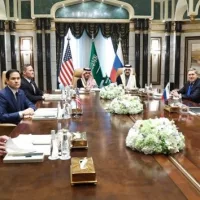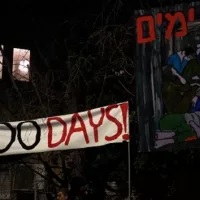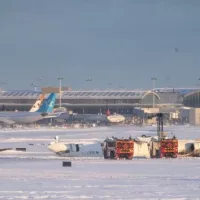
(LONDON) — High-level delegations from the U.S. and Russia held talks in Saudi Arabia on Tuesday over the fate of Ukraine, the negotiations taking place without Kyiv’s participation.
The State Department said the talks were aimed to discuss ending the now three-year-long war, which began with Russia’s full-scale invasion of its neighbor in 2022 and followed sustained cross-border aggression from Moscow since 2014.
Tuesday’s meeting in Riyadh concluded after around five hours, according to the press pool covering the meeting, with the State Department saying the discussions represented “an important step forward” toward “enduring peace.”
The talks between Moscow and Washington end a period of some three years — since President Joe Biden and Russian President Vladimir Putin met in Geneva before Russia invaded Ukraine — without senior-level engagement between the two nations.
The U.S. team was led by Secretary of State Marco Rubio, Middle East envoy Steve Witkoff and National Security Adviser Michael Waltz. The Russian negotiating delegation included Foreign Minister Sergei Lavrov, Kremlin foreign policy adviser Yuri Ushakov and Kirill Dmitriev, the head of Russia’s sovereign wealth fund.
State Department spokesperson Tammy Bruce said the U.S. team agreed to establish “a consultation mechanism to address irritants to our bilateral relationship with the objective of taking steps necessary to normalize the operation of our respective diplomatic missions.” Rubio told the Associated Press the two sides agreed to restore embassy staffing as part of this normalization.
The two sides also agreed to appoint “high-level teams to begin working on a path to ending the conflict in Ukraine as soon as possible in a way that is enduring, sustainable and acceptable to all sides,” Bruce said, plus to “lay the groundwork for future cooperation on matters of mutual geopolitical interest and historic economic and investment opportunities which will emerge from a successful end to the conflict in Ukraine.”
“The parties to today’s meetings pledge to remain engaged to make sure the process moves forward in a timely and productive manner,” Bruce added.
Ukrainian President Volodymyr Zelenskyy responded to the talks while visiting Turkey, suggesting Russia was reviving ultimatums it issued as part of the peace talks that took place in the early stages of Moscow’s full-scale invasion.
“I have the impression that there are now some negotiations happening and they have the same mood, but between Russia and the United States,” Zelenskyy said at the Ukrainian embassy in Ankara.
“Again, about Ukraine without Ukraine,” he added. “It’s interesting, if Ukraine didn’t yield to ultimatums in the most difficult moment, where does the feeling come from that Ukraine will agree to this now?”
“I never intended to yield to Russia’s ultimatums and I don’t intend to now,” Zelenskyy said.
Lavrov and Rubio talked on the phone Saturday, according to the State Department, after a conversation between Putin and President Donald Trump last week.
While a spokesperson for Putin said the meeting would be “devoted” primarily to “restoring the entire range of Russian-American relations,” Bruce said that the meeting would be more narrowly focused on the “larger issue of Ukraine.”
After the Trump-Putin conversation, Bruce called the meeting the “second step to determine if the Russians perhaps are serious, and if they’re on the same page.”
Ukraine ‘will not recognize’ deal struck without it
Zelenskyy was not invited to the meeting. Zelenskyy said Monday that Ukraine “cannot acknowledge any … agreements about us without us, and will not recognize such agreements.”
“Earlier, during the war, it was considered taboo to talk to the aggressor,” the Ukrainian president said.
On Tuesday, Kremlin spokesperson Dmitry Peskov told journalists that Putin is prepared for negotiations with Zelenskyy “if necessary,” though again questioned the Ukrainian president’s legitimacy. Putin and his officials have repeatedly framed Zelenskyy as illegitimate, citing the delay to planned Ukrainian presidential elections necessitated by martial law.
Amid the flurry of diplomatic activity, French President Emmanuel Macron convened a meeting of European heads of government in Paris Monday ahead of the U.S.-Russia engagement.
Macron and Trump spoke via telephone for nearly 30 minutes prior to the European meeting, a White House official said. The official called the conversation “friendly” and said it included discussion of the war in Ukraine and the U.S.-Russia bilateral meetings Tuesday.
Mike Waltz, the White House national security adviser, said on Sunday he would “push back on … any notion that [Ukrainians] aren’t being consulted.”
“They absolutely are. And at the end of the day, though, this is going to be under President Trump’s leadership that we get this war to an end,” Waltz said, conceding “they may not like some of the sequencing that is going on in these negotiations.”
Zelenskyy himself was in the Middle East, where he met with officials in the United Arab Emirates Monday, with Tuesday meetings scheduled in Turkey and Saudi Arabia. Zelenskyy said he would ask Saudi de facto leader and Crown Prince Mohammed bin Salman about the U.S.-Russia meetings when in Riyadh.
The opening of White House-facilitated talks on peace in Ukraine came after Trump officials signaled potential terms for a deal in the lead up to, and during, the Munich Security Conference in Germany last week.
Ahead of the conference, Defense Secretary Pete Hegseth called a return to Ukrainian borders before Russia’s 2014 invasion of Crimea “unrealistic.” That “illusionary goal” — and NATO membership for Ukraine — would not be promoted by the U.S., the secretary said.
Zelenskyy told Munich attendees that Ukraine must be assured of membership in “NATO, or a reliable alternative.”
He called for the building of the “armed forces of Europe” as the Trump administration presses for more European spending on defense.
Among the attendees of Macron’s hastily organized meeting in Paris, the prime ministers of the United Kingdom and Sweden said they would be open to contributing armed forces on the ground in Ukraine in a peacekeeping capacity after a potential deal is struck.
“If there is a peace deal [for Ukraine], and everybody wants a peace deal, then it’s got to be a lasting peace deal, not just a pause for Putin to come again,” U.K. Prime Minister Keir Starmer said in Paris.
“There’s also a wider piece here which is the collective security and defense in Europe, and here, I think we’ve got a generational challenge. We’ve all got to step up,” he added.
ABC News’ Molly Nagle, Patrick Reevell, Yulia Drozd and Joe Simonetti contributed to this report.
Copyright © 2025, ABC Audio. All rights reserved.














